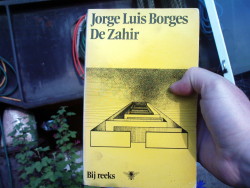This post is prompted by my reading of Umberto Eco’s “Borges and My Anxiety of Influence” in On Literature and finding the terms blituri, skindapsos, babazuf and tophlattothrattophlattothrat, four early nonsense words.
In a different chapter, “Between La Mancha and Babel” of that same On Literature, Eco claims that Jorge Luis Borges invented the “exquisite Joyce – flavoured calembour whateverano (which can be read as ‘what a summer’ and ‘whatever is summer’).
Perhaps that is correct.
However, I found the term whatever-ano (ah … the joys of Google Books) in Thomas De Quincey‘s essay “Orthographic Mutineers“:
- adoptado by anybody-ini whatever-ano[1]
I admit, whatever-ano here has not the same wordplay-value; however, it has the same orthography (except for the hyphen) and perhaps Borges, who was a fan of Quincey, read it here first and in a case of cryptomnesia, “invented” it many years later.
Ah… (one of my favorite words of late it would seem), the anxiety of influence!.


